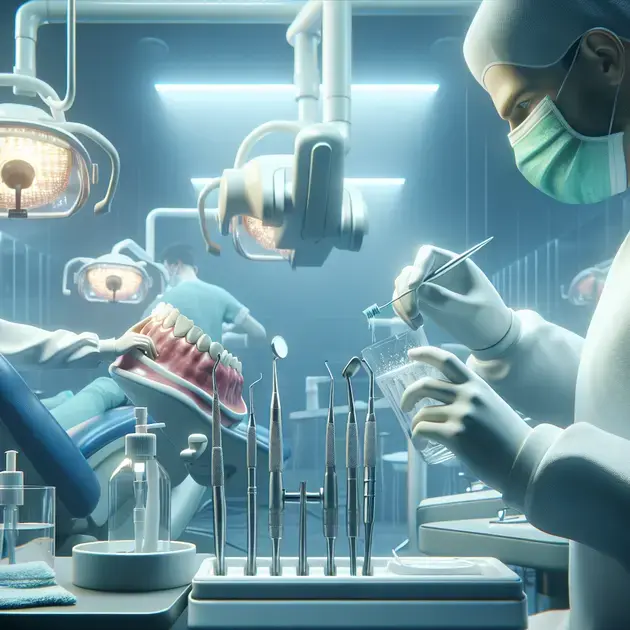When it comes to oral health, preventing cavities decay is essential for maintaining healthy teeth. Cavities, also known as dental caries, are a common oral health issue that can lead to tooth decay if not properly addressed.
Implementing a good oral hygiene routine, including regular brushing, flossing, and dental check-ups, is crucial in preventing cavities decay. Additionally, paying attention to your diet and reducing intake of sugary foods and drinks can also help maintain optimal oral health.

Essential Oral Hygiene Practices
Oral hygiene is crucial for maintaining overall health and preventing dental issues. By following essential oral hygiene practices, you can keep your mouth healthy and free from common problems such as cavities, gum disease, and bad breath. Here are some key practices to incorporate into your daily routine:
1. Brushing Twice a Day
Brushing your teeth twice a day with fluoride toothpaste helps remove plaque and bacteria that can lead to tooth decay and gum disease. Use a soft-bristled toothbrush and gentle, circular motions to effectively clean all surfaces of your teeth.
To ensure you are brushing properly, you can use the app “Brush DJ,” which plays music for two minutes to help you brush for the recommended time.
2. Flossing Daily
Flossing is essential for removing food particles and plaque from between your teeth where your toothbrush cannot reach. Make it a habit to floss at least once a day to prevent cavities and gum inflammation.
You can track your flossing habits and set reminders with the app “Dental Care & Flossing Reminder,” which helps you stay consistent with your oral hygiene routine.
3. Using Mouthwash
Mouthwash can help reduce plaque, prevent gingivitis, and freshen your breath. Choose a mouthwash that contains fluoride and antimicrobial ingredients for better oral health benefits.
The app “Colgate Connect” offers personalized recommendations for mouthwash based on your oral care needs and preferences.
4. Regular Dental Check-ups
Regular visits to the dentist are essential for maintaining good oral health. Dentists can detect early signs of dental problems, provide professional cleanings, and offer personalized advice for your oral hygiene routine.
You can schedule dental check-ups easily using the website “Zocdoc,” which allows you to find and book appointments with dentists in your area.
The Importance of Regular Dental Check-ups
Regular dental check-ups are a fundamental part of preventive oral care. Visiting your dentist on a routine basis can help identify and address potential issues before they escalate into more significant problems. Here are the key reasons why regular dental check-ups are essential:
1. Early Detection of Dental Problems
During a dental check-up, your dentist will perform a comprehensive examination of your teeth, gums, and oral tissues. This allows them to identify any signs of cavities, gum disease, or oral cancer at an early stage when treatment is more effective.
You can easily find local dentists offering comprehensive check-ups on the website “Healthgrades,” which provides patient reviews and ratings to help you choose the right dental provider.
2. Professional Cleaning and Maintenance
In addition to examining your oral health, dental check-ups typically include professional cleaning to remove plaque and tartar buildup. Dentists have specialized tools and techniques to clean your teeth thoroughly, promoting better oral hygiene and preventing issues like decay and bad breath.
You can book a cleaning appointment with a dental hygienist through the app “SmileDirectClub,” which offers convenient scheduling options and personalized care recommendations.
3. Personalized Oral Care Guidance
During your dental check-up, your dentist can provide personalized guidance on oral care practices tailored to your specific needs. Whether you need advice on proper brushing and flossing techniques or recommendations for oral hygiene products, your dentist can help you establish a customized oral care routine.
For additional oral care tips and guidance, you can consult with dentists online through the platform “Teledentistry,” which offers virtual consultations and expert advice from licensed dental professionals.

**Regular Dental Care Practices**
Importance of Regular Dental Care
Regular dental care is essential for maintaining good oral health. By visiting your dentist regularly, you can prevent and detect any potential issues before they become major problems. Dental check-ups typically involve a professional cleaning to remove plaque and tartar buildup, as well as a thorough examination of your teeth and gums. This proactive approach can help you avoid more extensive and expensive dental treatments down the line.
At-Home Dental Care Routine
In addition to regular dental check-ups, it is crucial to maintain a consistent at-home dental care routine. This includes brushing your teeth at least twice a day with a fluoride toothpaste, flossing daily, and using mouthwash to kill bacteria and freshen your breath. Proper at-home care can help prevent cavities, gum disease, and other oral health issues.
Healthy Diet and Oral Health
Your diet plays a significant role in your oral health. Consuming sugary and acidic foods and beverages can lead to tooth decay and enamel erosion. To maintain healthy teeth and gums, focus on eating a balanced diet rich in fruits, vegetables, and lean proteins. Drinking plenty of water throughout the day can also help rinse away food particles and bacteria that can cause dental problems.
The Importance of Fluoride
Fluoride is a mineral that helps strengthen tooth enamel and prevent tooth decay. Many toothpaste brands contain fluoride to provide added protection against cavities. Using a fluoride toothpaste as part of your daily oral care routine can help protect your teeth and promote overall oral health. Your dentist may also recommend additional fluoride treatments for added protection.
Regular Dental Care for Children
It is crucial to establish good dental habits early in life. Children should visit the dentist regularly for check-ups and cleanings to ensure proper oral development and prevent cavities. Parents can help children brush and floss properly, monitor their diet, and encourage healthy habits to set them up for a lifetime of good oral health.
**How to Choose the Right Toothpaste**
Consider Your Oral Health Needs
When choosing the right toothpaste for your oral care routine, consider your specific oral health needs. If you are prone to cavities, a fluoride toothpaste can help strengthen enamel and prevent decay. For sensitive teeth, look for toothpaste designed to reduce sensitivity and protect against pain from hot or cold temperatures. Whitening toothpaste can help remove surface stains and brighten your smile.
Check for ADA Seal of Approval
The American Dental Association (ADA) evaluates oral care products to ensure they meet safety and effectiveness standards. Look for the ADA Seal of Approval on toothpaste packaging to ensure you are choosing a product that has been rigorously tested and proven to be safe and beneficial for your oral health. This seal indicates that the toothpaste contains fluoride and has met strict quality control guidelines.
Avoid Harmful Ingredients
Some toothpaste products may contain ingredients that can be harmful to your oral health. Avoid toothpaste with high levels of abrasives, such as silica, which can wear down enamel and cause sensitivity. Additionally, be cautious of toothpaste with artificial sweeteners, dyes, and flavors that may irritate your mouth or lead to allergic reactions. Opt for natural toothpaste options that are free of harsh chemicals and additives.
Consult with Your Dentist
If you are unsure about which toothpaste is right for you, consult with your dentist. Your dentist can recommend a toothpaste based on your oral health needs, such as preventing gum disease, restoring enamel, or maintaining fresh breath. They can also provide guidance on proper brushing techniques and the importance of regular dental check-ups for optimal oral health.
Try Different Formulas
It may take some trial and error to find the right toothpaste that suits your preferences and needs. Don’t be afraid to try different formulas and brands to see which one works best for you. Whether you prefer a gel or paste, minty or fruity flavor, or a specific specialty formula, there are plenty of options available to cater to your individual oral care requirements.
**Effective Ways to Reduce Sugar Intake**
Understand the Impact of Sugar on Oral Health
Consuming excess sugar can have detrimental effects on your oral health. Sugar feeds harmful bacteria in your mouth, leading to acid production that can erode tooth enamel and cause cavities. By understanding the impact of sugar on your teeth and gums, you can take steps to reduce your sugar intake and protect your oral health.
Read Food Labels Carefully
Many processed foods and beverages contain hidden sugars that can contribute to your overall sugar intake. When shopping for groceries, read food labels carefully to identify added sugars in products such as sodas, snacks, condiments, and even seemingly healthy foods like yogurt and granola bars. Opt for whole foods and natural snacks to reduce your sugar consumption.
Choose Sugar-Free Alternatives
Instead of reaching for sugary treats and drinks, consider sugar-free alternatives to satisfy your sweet cravings. Stevia, erythritol, and xylitol are natural sweeteners that can be used in place of sugar in recipes and beverages. You can also enjoy fresh fruits, unsweetened snacks, and flavored sparkling water as healthier alternatives to high-sugar products.
Modify Your Cooking and Baking
When preparing meals and desserts at home, experiment with reducing the amount of sugar called for in recipes. You can often cut back on sugar without sacrificing taste by adding natural sweeteners like cinnamon, vanilla extract, or mashed ripe bananas. By gradually reducing the sugar content in your homemade dishes, you can train your taste buds to enjoy less sweetness.
Practice Mindful Eating Habits
Mindful eating involves paying attention to your food choices, portion sizes, and eating habits to promote a healthy relationship with food. By being mindful of your sugar intake and making conscious decisions about what and how much you consume, you can reduce unnecessary sugar consumption and support your overall well-being. Slow down, savor each bite, and choose nutrient-dense foods that nourish your body without excessive added sugars.
Conclusion
In conclusion, maintaining regular dental care practices is crucial for preserving good oral health. By scheduling routine check-ups with your dentist, you can proactively address any potential issues before they escalate, ultimately avoiding more extensive and costly treatments in the future. Coupled with a consistent at-home dental care routine, which includes daily brushing with fluoride toothpaste, flossing, and using mouthwash, you can significantly reduce the risk of cavities and gum disease.
Furthermore, being mindful of your diet and its impact on oral health is essential. Opting for a balanced diet rich in fruits, vegetables, and lean proteins while limiting sugary and acidic foods can help maintain healthy teeth and gums. Additionally, incorporating fluoride toothpaste into your daily routine can strengthen tooth enamel and prevent decay, further promoting overall oral health.
When it comes to choosing the right toothpaste, considering your specific oral health needs, checking for the ADA Seal of Approval, and avoiding harmful ingredients are key factors to keep in mind. Consulting with your dentist for personalized recommendations and trying different formulas can help you find the toothpaste that best suits your preferences and requirements, ensuring optimal oral care.